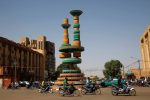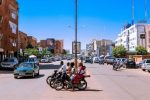What you need to know about Burkina Faso
Here’s a beginner’s guide to one of the world’s poorest countries:

1. Located in the heart (and heat) of West Africa, between the Sahara desert and the forests of the south, Burkina Faso has one of the highest fertility rates in the world. The average Burkinabe woman has six children. As a consequence, the population has increased five-fold in the past half-century. At 15 million, however, it is still under-populated compared to Great Britain, which is of similar size but has four times more people. It’s still too crowded though for the 3.5 million Burkinabe who live and work in neighbouring Ivory Coast.
2. Known in colonial times as Upper Volta, Burkina Faso means ‘Land of the Honourable People.’ Burkinabes are known as among the most honest folk in Africa.
3. The country has arguably the world’s best place names. Its capital – one of the oldest cities on Earth – is Ouagadougou. Leafy Bobo-Dioulasso, from where I am writing this, is the second city. It also boasts the desert market town of Gorom-Gorom (so good they named it twice), Bouroum-Bouroum (ditto), Fada N’Gourma, Tin-Akof, Niangoloko and, er, Rambo.
4. Burkina has few natural resources. The French only colonised it because it was a bridge between their coastal territories of Benin and Ivory Coast and their desert holdings in modern-day Mali and Niger. It even stopped being a country for 15 years from 1932, when it was carved up between its more important neighbours. The French made good use of Upper Volta’s human resources, however, forcing hundreds of thousands to build railways, farm cocoa and fight in the First World War trenches.
5. The country is dominated by the Mossi ethnic group. A tribe of brilliant horsemen (which may account for the profusion of betting shops in Bobo), the Mossi repelled slave raiders and other rivals and remained intact for 400 years until their kingdom fell to the French. Captain Paul Voulet, who led the French expedition, was a real-life Kurtz figure, who stuck victims’ heads on poles, roasted children over fires, and strung up soldiers who displeased him at a height where their feet could be reached by hyenas’ hungry jaws. When his superiors tried to rein him in, he told his troops he was no longer French but a “black chief,” who would found his own empire. After he was killed, the French, embarrassed that their civilising mission in their colonies had gone awry, attributed Voulet’s activities to the maddening heat of Africa.
6. Burkina Faso is one of Africa’s least urbanised societies. Despite plagues of locusts, catastrophic droughts, desertification, and the fatal effects of US cotton subsidies (Burkina produces cotton at one-quarter the cost of American cotton, but subsidies mean US producers can undercut Burkinabe farmers), over three-quarters still live in the countryside. The French colonial administrator R Delavignette wrote in 1946 that, ‘We came from an industrialised Europe where factories are joyless affairs, and found people who worked to music. Communal labour had its drums and tom-toms, its orchestras to cheer the workers on.’ Drummers still accompany farmers at planting and harvesting times today.
7. Burkina hosts Africa’s most important film festival, the biennial Fespaco (the next one is in 2011). Cinema attendances are falling, however, because of the proliferation of pirated DVDs.
8. Burkina was home to the ill-fated revolutionary Thomas Sankara, who as president alienated the French by calling them neo-colonialists, told the country’s creditors he wouldn’t pay them back (‘you played the game, you lost,’ he explained), slated African leaders for their corruption, and practised what he preached by ditching the ministerial Mercedes for a Renault 4, taking out a $2,000 mortgage to buy a house, and cycling around Ouagadougou on a rusty old bicycle (is David Cameron a secret fan?). Cheques he wrote often bounced. Sankara was killed in 1987 by soldiers close to his friend Blaise Compaore, who many suspect ordered the assassination. Frequently described as Africa’s Che Guevara, Sankara, who unlike most African revolutionaries died before he could sully his reputation, remains a hero to young idealists from all over the continent.
9. Blaise Compaore is still the Presdient of Burkina Faso today. Something of an eminence grise, as well as being linked to Sankara’s death he was also implicated in civil wars in Liberia and Sierra Leone, and is a longstanding supporter of the vicious Liberian warlord Charles Taylor (currently on trial in The Hague for war crimes). On the other hand, Compaore has also helped broker peace, for now, in Guinea. In the 2005 election, judged ‘free and fair’ by the 1500 (count ’em) international observers who were flown in to watch, he gained 80% of the vote.
10. Burkina’s main cities saw violent street protests in 2008, as food and fuel prices climbed beyond the reach of most urbanites. As Compaore has loosened his dictatorial grip on the country, protests of all kinds have increased. One year, the authorities in Ouagadougou tried to force motorcycle riders to wear helmets. Vigorous rioting forced them to back down.

